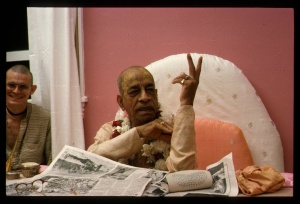CC Madhya 11.58 (1975): Difference between revisions
(Vanibot #0027: CCMirror - Mirror CC's 1996 edition to form a basis for 1975) |
(Vanibot #0020: VersionCompareLinker - added a link to the Version Compare feature) |
||
| Line 2: | Line 2: | ||
<div style="float:left">'''[[Sri Caitanya-caritamrta (1975)|Śrī Caitanya-caritāmṛta (1975)]] - [[CC Madhya (1975)|Madhya-līlā]] - [[CC Madhya 11 (1975)|Chapter 11: The Beḍā-kīrtana Pastimes of Śrī Caitanya Mahāprabhu]]'''</div> | <div style="float:left">'''[[Sri Caitanya-caritamrta (1975)|Śrī Caitanya-caritāmṛta (1975)]] - [[CC Madhya (1975)|Madhya-līlā]] - [[CC Madhya 11 (1975)|Chapter 11: The Beḍā-kīrtana Pastimes of Śrī Caitanya Mahāprabhu]]'''</div> | ||
<div style="float:right">[[File:Go-previous.png|link=CC Madhya 11.57 (1975)|Madhya-līlā 11.57]] '''[[CC Madhya 11.57 (1975)|Madhya-līlā 11.57]] - [[CC Madhya 11.59 (1975)|Madhya-līlā 11.59]]''' [[File:Go-next.png|link=CC Madhya 11.59 (1975)|Madhya-līlā 11.59]]</div> | <div style="float:right">[[File:Go-previous.png|link=CC Madhya 11.57 (1975)|Madhya-līlā 11.57]] '''[[CC Madhya 11.57 (1975)|Madhya-līlā 11.57]] - [[CC Madhya 11.59 (1975)|Madhya-līlā 11.59]]''' [[File:Go-next.png|link=CC Madhya 11.59 (1975)|Madhya-līlā 11.59]]</div> | ||
{{CompareVersions|CC|Madhya 11.58|CC 1975|CC 1996}} | |||
{{RandomImage}} | {{RandomImage}} | ||
==== TEXT 58 ==== | ==== TEXT 58 ==== | ||
| Line 11: | Line 10: | ||
<div class="verse"> | <div class="verse"> | ||
:rāmānanda rāya, āji tomāra prema-guṇa | :rāmānanda rāya, āji tomāra prema-guṇa | ||
:prabhu-āge kahite prabhura | :prabhu-āge kahite prabhura phiri' gela mana | ||
</div> | </div> | ||
| Line 18: | Line 17: | ||
<div class="synonyms"> | <div class="synonyms"> | ||
rāmānanda rāya—Rāmānanda Rāya; āji—today; tomāra—your; prema-guṇa—quality of love; prabhu-āge—in front of the Lord; kahite—when he described; prabhura—of Lord Śrī Caitanya Mahāprabhu; | rāmānanda rāya—Rāmānanda Rāya; āji—today; tomāra—your; prema-guṇa—quality of love; prabhu-āge—in front of the Lord; kahite—when he described; prabhura—of Lord Śrī Caitanya Mahāprabhu; phiri' gela—became changed; mana—the mind. | ||
</div> | </div> | ||
| Line 25: | Line 24: | ||
<div class="translation"> | <div class="translation"> | ||
"The Lord has already changed His mind due to Rāmānanda Rāya's description of your pure love for Him." | |||
</div> | </div> | ||
| Line 32: | Line 31: | ||
<div class="purport"> | <div class="purport"> | ||
At first the Lord did not want to see the King, but due to the | At first the Lord did not want to see the King, but due to the Bhaṭṭācārya's and Rāmānanda Rāya's earnest endeavors, the Lord's mind was changed. The Lord already declared that Kṛṣṇa would be merciful upon the King due to the King's service to the devotees. This is the process by which one can advance in Kṛṣṇa consciousness. First there must be the devotee's mercy; then Kṛṣṇa's mercy will descend. Yasya prasādād bhagavat-prasādo yasyāprasādān na gatiḥ kuto 'pi. Our first duty, therefore, is to satisfy the spiritual master, who can arrange for the Lord's mercy. A common man must first begin to serve the spiritual master, or the devotee. Then, through the mercy of the devotee, the Lord will be satisfied. Unless one receives the dust of a devotee's lotus feet on one's head, there is no possibility of advancement. This is also confirmed by a statement of Prahlāda Mahārāja's in Śrīmad-Bhāgavatam ([[SB 7.5.32]]): | ||
:naiṣāṁ matis tāvad urukramāṅghriṁ | :naiṣāṁ matis tāvad urukramāṅghriṁ | ||
:spṛśaty anarthāpagamo yad-arthaḥ | :spṛśaty anarthāpagamo yad-arthaḥ | ||
:mahīyasāṁ pāda-rajo- | :mahīyasāṁ pāda-rajo-'bhiṣekaṁ | ||
:niṣkiñcanānāṁ na vṛṇīta yāvat | :niṣkiñcanānāṁ na vṛṇīta yāvat | ||
Unless one approaches a pure devotee, he cannot understand the Supreme Personality of Godhead. Mahārāja Pratāparudra worshiped both Rāmānanda Rāya and Sārvabhauma Bhaṭṭācārya. Thus he touched the lotus feet of pure devotees and was able thereby to approach Śrī Caitanya Mahāprabhu. | Unless one approaches a pure devotee, he cannot understand the Supreme Personality of Godhead. Mahārāja Pratāparudra worshiped both Rāmānanda Rāya and Sārvabhauma Bhaṭṭācārya. Thus he touched the lotus feet of pure devotees and was able thereby to approach Śrī Caitanya Mahāprabhu. | ||
</div> | </div> | ||
Latest revision as of 06:42, 27 January 2020

A.C. Bhaktivedanta Swami Prabhupada
TEXT 58
- rāmānanda rāya, āji tomāra prema-guṇa
- prabhu-āge kahite prabhura phiri' gela mana
SYNONYMS
rāmānanda rāya—Rāmānanda Rāya; āji—today; tomāra—your; prema-guṇa—quality of love; prabhu-āge—in front of the Lord; kahite—when he described; prabhura—of Lord Śrī Caitanya Mahāprabhu; phiri' gela—became changed; mana—the mind.
TRANSLATION
"The Lord has already changed His mind due to Rāmānanda Rāya's description of your pure love for Him."
PURPORT
At first the Lord did not want to see the King, but due to the Bhaṭṭācārya's and Rāmānanda Rāya's earnest endeavors, the Lord's mind was changed. The Lord already declared that Kṛṣṇa would be merciful upon the King due to the King's service to the devotees. This is the process by which one can advance in Kṛṣṇa consciousness. First there must be the devotee's mercy; then Kṛṣṇa's mercy will descend. Yasya prasādād bhagavat-prasādo yasyāprasādān na gatiḥ kuto 'pi. Our first duty, therefore, is to satisfy the spiritual master, who can arrange for the Lord's mercy. A common man must first begin to serve the spiritual master, or the devotee. Then, through the mercy of the devotee, the Lord will be satisfied. Unless one receives the dust of a devotee's lotus feet on one's head, there is no possibility of advancement. This is also confirmed by a statement of Prahlāda Mahārāja's in Śrīmad-Bhāgavatam (SB 7.5.32):
- naiṣāṁ matis tāvad urukramāṅghriṁ
- spṛśaty anarthāpagamo yad-arthaḥ
- mahīyasāṁ pāda-rajo-'bhiṣekaṁ
- niṣkiñcanānāṁ na vṛṇīta yāvat
Unless one approaches a pure devotee, he cannot understand the Supreme Personality of Godhead. Mahārāja Pratāparudra worshiped both Rāmānanda Rāya and Sārvabhauma Bhaṭṭācārya. Thus he touched the lotus feet of pure devotees and was able thereby to approach Śrī Caitanya Mahāprabhu.